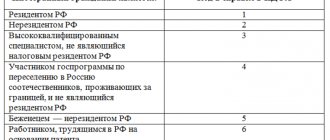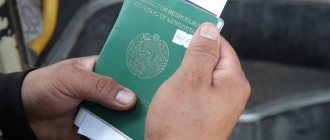You can move to the Russian Federation both on the basis of the Resettlement Program, by obtaining certain statuses, and independently of government programs on a general basis.
NB!
We remind you that due to coronavirus infection, most countries in the world have banned or limited entry. As of July 1, 2021, according to information from the Federal Tourism Agency, the following are available for travel from the Russian Federation:Abkhazia, Azerbaijan, Armenia, Belarus, Great Britain, Vietnam, Greece, Georgia, Egypt, India, Kazakhstan, Qatar, Kyrgyzstan, Cuba, Maldives, UAE, Seychelles, Serbia, Singapore, Tanzania, Turkey (flights resumed from June 22), Finland, Switzerland, Ethiopia, South Korea, Japan.
We recommend checking with the office about the procedure and reasons for allowing entry. websites of diplomatic missions of the above countries.
The information presented in the article further concerns travel outside of coronavirus restrictions.
There are several options for moving to Russia for permanent residence:
- Taking part in the State Resettlement Program (relevant for foreigners born in the USSR, who at one time left for permanent residence in another Russian state).
- Obtaining temporary asylum (suitable for Ukrainians).
- Obtaining refugee status (for persons subject to personal persecution by the authorities of their country).
- Obtaining citizenship in a simplified form (suitable for relatives of Russian citizens and Russian-speaking foreigners).
- Obtaining a residence permit, which gives almost equal rights and social guarantees to Russians, but at the same time allows you to remain a citizen in your homeland.
- Obtaining citizenship according to the general form after 5 years of residence in the country.
First, let's define the terminology. Permanent residence is just an abbreviation that means “permanent place of residence”; this phrase has no legal meaning. It is often confused with a residence permit (residence permit) - a document that gives a migrant the right to long-term residence in a foreign country. There is also no particular sense in the combinations “documents for permanent residence in Russia” or “write an application for permanent residence.” If by permanent residence we mean moving to Russia for permanent residence, then for this each foreigner will have to draw up several different documents and go through several lengthy procedures in time.
State program for the resettlement of compatriots
The easiest and fastest option for moving to the Russian Federation for permanent residence is to participate in the State Resettlement Program. To do this, it is necessary that the applicant has Russian roots and is familiar with life in Russia, with its traditions and foundations. These are primarily ethnic Russians who left the country and became citizens of other states. Former citizens of the USSR and their descendants, emigrants who left the Russian state will be able to take part in the program. It is clear that the applicant must speak excellent Russian and meet a number of other criteria. Thus, its participant must first of all be legally capable, of age and able to work. In addition, he must have an education, which must be documented. To participate in the State Program, a form is filled out and a certain package of documents is prepared.
We recommend: a detailed information package from the Main Directorate for Migration Affairs of the Ministry of Internal Affairs of the Russian Federation on the resettlement program is available here. (Updated 06/08/2019 - information based on the results of 2018).
After arriving in the Russian Federation, the participant draws up a temporary residence permit, which is issued without taking into account quotas, and can immediately find a job without receiving additional papers.
Temporary shelter
Anyone who wants to survive a difficult stopover in their country will be able to obtain temporary asylum The status was introduced in the early 90s and has no relation to modern events in Ukraine. However, at present, its citizens can apply for refugee status, since the main reason for obtaining it is the existence of a serious threat to the life and health of a foreigner in their homeland.
You must write an application, undergo fingerprinting, provide a medical certificate and photographs. All documentation is transferred to the Main Directorate for Migration of the Ministry of Internal Affairs (former FMS - ed.). After approval, the applicant is issued a temporary certificate, which will be his main document in the Russian Federation. In this case, the national passport remains in the Main Directorate for Migration of the Ministry of Internal Affairs. With a temporary certificate you can get a job without obtaining a patent. It can be used to get married. In addition, the status holder can apply for financial assistance, which is established individually for each region, use free medical services and receive education. We can say that foreigners with temporary asylum status have social rights similar to Russians: they can also be treated in clinics, work without additional documents, and teach children in schools.
The status is assigned only for 12 months. It is then extended until returning to your home country is possible.
Refugee status
Refugee status is granted to foreigners who are subject to personal persecution by the authorities in their own country. Its owner has a number of social guarantees:
- Receiving free medical care;
- Obtaining a place for a child in kindergarten or school;
- Employment without registration of additional documents.
Naturally, after a foreigner is granted refugee status, a Russian passport is not automatically issued. The status is retained for migrants for 3 years, then can be extended. Acquisition of citizenship will be possible after 4 years of residence in the country.
How to obtain permanent residence in Russia - permanent residence status, what it is, its advantages in 2021
Often, Russians themselves and foreign citizens who want to move to live in Russia do not understand what is meant by the concept of “permanent residence status.” Meanwhile, you need to understand that for many immigrants, having permanent residence does not solve all problems. In this article we will explain what permanent residence is, how it differs from temporary residence permit and residence permit, what advantages the status provides, who has the right to apply for permanent residence, how to obtain permanent residence in Russia, what documents are needed, where foreigners are allowed to go for permanent residence in the Russian Federation.
What is meant by the concept of permanent residence - what is permanent residence
The abbreviation “permanent residence” stands for “permanent residence,” but the definition of the concept has not been established at the legislative level. The presence of permanent residence permit can confirm the status of a citizen of any country or the status of a foreign person who is in the country legally, has legalized residence and does not plan to leave its territory.
According to Russian laws, one way or another relating to the status of permanent residence in the Russian Federation, migrants are of the following types:
- residing in the country on a permanent basis (having a residence permit - residence permit);
- those living in Russia on a temporary basis (having a temporary residence permit for 3 years - TRP);
- temporarily staying in Russia (those who crossed the border of the Russian Federation in a visa-free regime and living on the basis of a work patent).
How does permanent residence differ from temporary residence permit, residence permit and Russian citizenship?
A temporary residence permit and a residence permit are documents that help legitimize residence on the territory of the Russian Federation, while permanent residence is only confirmation of the fact of residence in the country. A temporary residence permit must be issued if a foreigner plans to live in Russia for 3 years, and it is important to remain in a certain region. A temporary residence permit allows its holder to find a job without first obtaining a work patent and apply for a residence permit - the next status.
A residence permit already gives a foreign citizen the right to reside within the borders of the Russian Federation for 5 years, and it can also be extended. However, usually a residence permit is not extended, since the document allows you to obtain citizenship, obtain a Russian passport and live in Russia on a permanent basis, enjoying the rights of a Russian citizen.
How to obtain permanent residence in Russia - what gives a foreigner the status of permanent residence in the Russian Federation
Important! Having permanent residence status (having issued a residence permit), a foreign citizen independently decides whether to renew his residence permit or apply for a Russian citizen passport.
As soon as a foreign citizen is issued a residence permit in the Russian Federation, he automatically becomes the holder of permanent residence status. If you have the status of permanent residence, you can legally reside in any subject of the Russian Federation at the choice of the foreigner, and also exercise a wide range of rights, almost comparable to the list of freedoms of citizens of the Russian Federation.
However, it should be remembered that a residence permit (and, accordingly, permanent residence) implies not only the emergence of new rights and freedoms, but also responsibilities on the part of its owner - the foreigner will have to respect the lifestyle and traditions of the population, comply with laws and regulations .
Who can apply for permanent residence
According to the law, the following categories of foreign citizens have the right to register a permanent place of residence on the territory of the Russian Federation:
- native speakers of the official language of the Russian Federation – Russian;
- foreign nationals who graduated from a Russian university;
- foreigners who have married a citizen of the Russian Federation (they must have lived in marriage for 3 years);
- citizens who have lived outside Russia for a long time, but previously had Russian citizenship;
- highly qualified specialists, as well as their spouses, children and parents;
- foreign citizens who have issued a residence permit, their family and relatives;
- refugees;
- compatriots of Russian citizens taking part in the program to promote voluntary resettlement to Russia;
- labor migrants;
- other categories of foreign citizens who have managed to live in the Russian Federation for at least 1 year, having a temporary residence permit.
Pros and cons of permanent residence status in Russia
Foreigners who are going to obtain permanent residence status in Russia should take into account its advantages and disadvantages:
| Pros of permanent residence | Cons of permanent residence |
| Availability of the opportunity to renew your residence permit or become a citizen of the country; the right to enter and leave Russia at any time; the ability to retain previous citizenship; the right to participate in referendums and municipal elections; right to receive social benefits services (pension, training on a budgetary basis, medical care under a policy, etc.); the opportunity to register ownership of real estate, live, run your own business, and find employment in any subject of the Russian Federation; there is no need to deal with visa extensions, permits and patents. | You cannot nominate yourself in elections or vote in state elections. level; you will have to re-transmit information about your place of residence to the Main Migration Department of the Ministry of Internal Affairs every year; lack of the right to serve in the FSB, Ministry of Internal Affairs, etc.; employers are reluctant to hire, landlords prefer not to rent housing to foreigners; you will have to live in regions of the Russian Federation with difficult living conditions, in which there are quotas for accepting migrants (if the move is carried out under a resettlement program); We will have to reorganize our daily life. |
How to obtain permanent residence in Russia - what documents will be needed
The list of required documents depends on who exactly is applying for permanent residence:
| Applicant category | List of documents |
| Foreign citizens applying for permanent residence using the standard route | Application in the prescribed form; 4 photographs measuring 3.5 by 4.5 cm; RVP, the validity period of which has not been exceeded; a certificate from the bank confirming the availability of sufficient funds to provide for yourself and your family; documents related to the child’s relocation (birth certificate, passport, notarized consent of a child aged 14-18 years to move to Russia); a medical certificate indicating the absence of HIV, tuberculosis, syphilis and other contagious dangerous diseases; a certificate proving knowledge of the Russian language, the basics of legislation and history of Russia (if the male applicant is less than 65 years old or the female applicant is less than 60 years old, and they do not have a diploma of study from a Russian university); receipt for payment of state duty in the amount of 3.5 thousand rubles. |
| Participants in the program to promote the voluntary resettlement of compatriots | Statement of desire to participate in the program; certificates, certificates of education, experience and qualifications; certificate of no criminal record; departure slip. |
| Refugees, applicants for political asylum | Identification; 4 photographs measuring 3.5 by 4.5 cm; documents concerning children. |
| Highly qualified specialists | Identification; marriage certificate (if available); birth certificates of children (if available); labor certificate. |
Expert opinion on the question of how to obtain Russian citizenship after obtaining a residence permit and assigning permanent residence status
Experts from the Russian Ministry of Internal Affairs note the comparative simplicity of obtaining Russian citizenship for foreign citizens living in Russia for permanent residence. Having a residence permit (permanent residence status), it is enough to wait for its validity to expire (in general, without benefits and simplified conditions - 5 years) and apply for a Russian passport.
A foreigner must write an application at the department of the Main Department of Migration Affairs of the Ministry of Internal Affairs at the place of residence and document the fact that he does not violate the laws of the country - he pays taxes on time, has enough funds for living, and has no debts to pay housing and communal services.
Legislative acts on the topic
| Decree of the Government of the Russian Federation dated March 3, 2007 No. 142 | On benefits for the transportation of personal property without paying import duties and taxes |
| Federal Law dated January 1, 2015 No. 74-FZ | On passing the exam in the Russian language, Russian history and the fundamentals of Russian legislation |
Common mistakes
Error: The foreign citizen did not renew the residence permit upon expiration of its validity, however, he intended to even stay in Russia under the status of permanent residence.
Comment: If a foreign citizen intends to use the rights that the permanent residence status provides, he must renew the residence permit every 5 years. Also, after 5 years, you can submit documents to acquire Russian citizenship.
Answers to common questions about how to obtain permanent residence in Russia
Question No. 1: Citizens of which countries can enter Russia for permanent residence using internal passports of their countries?
Answer: Citizens of Kyrgyzstan, Kazakhstan, Armenia, Ukraine, Belarus.
Question No. 2: Are holders of permanent residence in Russia required to register at their place of residence?
Answer: Yes, this procedure is mandatory.
Russian citizenship in a simplified form
Some categories of foreigners have the right to obtain citizenship in a simplified form. These are primarily Russian-speaking foreigners and persons who lived in the USSR. The main relaxation lies in the period of residence, which can range from several months to 4 years. All other requirements regarding mandatory knowledge of the language, having a permanent source of income, and being law-abiding remain the same.
Participants in the State Resettlement Program, spouses, children or parents of Russian citizens can also acquire citizenship using a simplified form.
The easiest way at the moment is to issue citizenship to holders of DPR and LPR passports - the application in accordance with the decree of April 24, 2019 is considered within 90 days and without additional fees. conditions.
Stages of legalization in Russia
If the applicant does not have the right to simplified acquisition of citizenship and is not suitable for participation in the State Resettlement Program, then he can move for permanent residence in the Russian Federation in the general manner. This means that you will have to go through several stages of legalization, receiving successively a temporary residence permit, a residence permit, and then citizenship.
Migration card
Even upon entering the country, foreigners fill out a migration card (MC), which will later be needed to obtain a temporary residence permit. All foreigners fill out the card, with the exception of Belarusians - when entering the Russian Federation, they simply present their passports and do not fill out the MK.
Migration registration
Within 7 days, a foreigner must contact the Main Migration Department of the Ministry of Internal Affairs and register for migration. An exception has been made for citizens of some countries. Ukrainians can reside in the Russian Federation for 90 days without registration, citizens of Armenia, Kazakhstan, and Belarus - 30 days.
Obtaining a temporary residence permit
The first step to obtaining permanent residence is obtaining a temporary residence permit (TRP). A foreigner can apply for his extradition even before leaving his country by contacting the Russian consulate located in his homeland. It is also possible to submit an application for this document upon arrival in the Russian Federation; to do this, you need to contact the Main Migration Department of the Ministry of Internal Affairs. Let us remind you that foreigners can stay in Russia only for the period for which a visa is issued if they enter the country using a visa. Visa-free entry is provided for CIS citizens, but the total time of residence in the country is limited to 3 months. This means that a foreigner has only 90 days to legalize his residence if he intends to stay in the Russian Federation further.
The temporary residence permit is issued for 3 years and cannot be extended. The document gives the right not only to reside in the Russian Federation, but also to find employment without completing additional documents. That is, you do not need to obtain a patent or work permit.
There are requirements and restrictions on the issuance of temporary residence permits. For example, a migrant cannot leave the Russian Federation for more than 6 months, since the temporary residence permit in this case is canceled. Work is permitted only in the region where the permit was issued.
There is one more very significant nuance: quotas are established for the issuance of temporary residence permits, which are approved annually, and for each region of the Russian Federation separately. For example, in 2021, 83,480 quotas are set for the entire country. This means that only 120 thousand people were able to obtain permission and remained to live in Russia. When quotas are exhausted, temporary residence permits are accordingly no longer issued.
Some categories of foreigners can receive a temporary residence permit without a quota. These are primarily residents of the former USSR, born in Russia, participants in the State Resettlement Program, foreign military personnel and others.
Citizens of Belarus and Turkmenistan, as well as highly qualified specialists, can bypass the stage of obtaining a temporary residence permit and immediately become holders of a residence permit.
Obtaining a residence permit
12 months after receiving a temporary residence permit, it becomes possible to obtain a residence permit (residence permit). It is issued for 5 years and can be extended in the future. To receive it, the applicant prepares a package of documents and submits it to the Main Migration Department of the Ministry of Internal Affairs. After issuing a residence permit, which is a form of the established form, the foreigner is obliged to annually notify the authorities of the Main Directorate of Migration Affairs of the Ministry of Internal Affairs about his residence in the Russian Federation. Absence in Russia for more than 6 months leads to automatic cancellation of the document.
Having a Russian residence permit, a foreigner remains a citizen of his country (with the exception of certain categories of persons), but at the same time has rights and social guarantees similar to Russians.
Obtaining citizenship in the general manner
5 years after living in Russia with a residence permit, a foreigner can apply for citizenship. For refugees and migrants who have received political asylum status, this period is reduced to 4 years. Military personnel can obtain citizenship after 3 years of service in the ranks of the Russian Armed Forces.
An important point: you need to live in Russia permanently, and not come from time to time. Absence from the Russian Federation for no more than 3 months a year is allowed, otherwise the calendar year will not be counted.
To become the holder of a Russian passport, the applicant must have excellent command of the Russian language, have a permanent source of income and renounce previous citizenship.
Moving to Russia from Ukraine
Ukrainians have the right to enter us without visas, using an internal passport, and stay in the country for 90 days without registration. However, to get a job and register a patent (and without it, Ukrainians will not be able to work in the Russian Federation), registration will still be required.
When moving to Russia for permanent residence, Ukrainians can count on the same program for the resettlement of compatriots, NRY and a simplified scheme. Citizens of Ukraine can also apply for simplified citizenship based on the presence of a Ukrainian passport. That is, it is enough to obtain a residence permit and you can collect documents for citizenship - there is no need to look for any additional grounds.
Citizens of this state also have another scheme: obtaining refugee status / providing temporary asylum. A refugee certificate is issued for three years and provides the opportunity to work without a patent and obtain citizenship according to a simplified scheme, but deprives the right to travel outside the territory of the Russian Federation during the validity period. A certificate of temporary asylum provides Ukrainians with the same rights and obligations as a refugee certificate, but is valid for 1 year.
- GCitizenship
Simplified scheme for obtaining Russian citizenship for the LPR
- Marina Danilova
- 28.08.2019
Refugee status allows Ukrainians to obtain a temporary residence permit in a simplified manner (without a quota). Then, based on the presence of a temporary residence permit, you can also obtain a residence permit. A year after the residence permit is issued, Ukrainian refugees can get a Russian passport. The exception is citizens of the LPR and DPR. According to Decree No. 187 of April 29, 2019, residents of certain areas of the Donetsk and Lugansk regions who were there on April 7, 2014 and April 27, 2014, respectively, have the right to obtain Russian citizenship on the basis of a refugee certificate or a certificate of temporary asylum without having to do RVP or residence permit. The decision period is 3 months.
Subscribe to Migranta Rus: Yandex News.
Pension after moving to the Russian Federation
Not only young families and the working population of other countries, but also retirees are moving to Russia. The countries of the former USSR signed an Agreement in the field of pensions. These are the Russian Federation, Ukraine, Belarus, Kyrgyzstan, Kazakhstan, Armenia, Moldova, Turkmenistan, Uzbekistan, Tajikistan. In accordance with the main provisions of this Agreement, when changing the country of residence, the status of a pensioner is retained by the migrant when moving to another country that has signed the Agreement, and he also has the right to pension benefits.
After moving and obtaining a residence permit or citizenship, you must contact the Pension Fund at your place of residence and take the following documents with you:
- Russian passport or residence permit;
- Work record book for requesting a pension file from the previous country of residence.
The pension is assigned after the corresponding application is written and the Pension Fund receives a response to the request. In this case, the payment of pensions occurs according to the laws of the Russian Federation. The pension size itself is also being revised in accordance with Russian legislation.
It is important to understand that a foreigner who has moved to the Russian Federation has the right to receive a pension only if he has a residence permit or Russian citizenship . At the same time, pension payments in the homeland are stopped.
Moving to the Russian Federation from Ukraine and Kazakhstan
There are more than enough reasons to move from Ukraine to Russia. This is an economic crisis, a difficult political situation, an aggravated national issue, and the closure of enterprises. However, the majority of ethnic Russians living in Ukraine sought to move to the Russian Federation even earlier, before the start of the tragic events. In the Russian Federation it is easier for a good specialist to find a job. Thanks to the same mentality, knowledge of the language and culture of the country, integration into new realities is quick and painless. The moving process will be especially simple for Ukrainians with Russian roots.
Ukrainians enter the Russian Federation without a visa using their national passport. Next, they go through all the stages of legalizing their residence in Russia. Initially, they receive a temporary residence permit; six months after its registration, it becomes possible to apply for a residence permit if the applicant has a permanent place of residence and a source of income.
To move from Kazakhstan to the Russian Federation, you will have to go through several official procedures. Initially, a permit for permanent residence in the Russian Federation is issued. It is issued at the police department at the place of residence in Kazakhstan. Upon arrival in the Russian Federation, you must register with the Main Migration Department of the Ministry of Internal Affairs and submit an application for a temporary residence permit, which is issued for 3 years. If there are grounds for participation in the State Resettlement Program, then you do not need to issue a temporary residence permit. Its participant immediately receives a residence permit.
“When you go to Russia for permanent residence, know what awaits you there...”
Hundreds and thousands of stories related to this seemingly simple process, which has been going on for more than two decades, have apparently reached the authorities of this country. Here they are finally talking about a new migration policy. But when will these yet-to-be-released laws come into effect and will they make the situation easier for our compatriots?
At the start - everything is simple
Here is just one of these many thousands of stories of people who decided to leave the former Soviet republics and move to the Russian Federation. We won’t talk about the reasons, but the main one is still quite clear - the call of the blood, the desire to live in the country of your ancestors and native language.
Having made this decision, the Zaripovs were relieved to learn that since they were born in Russia, they had some advantages. The procedure for completing all procedures and statuses is the same for everyone, but the time between successive receipt of the main statuses - temporary residence permit, residence permit and acquisition of citizenship - is significantly reduced.
War of the Worlds. Deadlocks in Armenia 06/30/2021 07:005099
“There was one more plus at the start. After hanging around in queues at the Russian Consulate in Almaty for a month and a half (this was in January 2014), we submitted our documents. And six months later, having moved to St. Petersburg, we received a temporary residence permit, which saved us several months of waiting. This was the first stage of the journey to a Russian passport,” says Svetlana Zaripova.
Bureaucracy in action
Then everything was much more painful. The queues at the regional FMS office were simply fantastic. It was necessary to occupy them late in the evening or early in the morning, sign up with some vague individuals who were on duty at the doors of the regional migration service, weeks or a month in advance, report daily, and then, when the deadline arrived, stand for several hours in the offices to hand over the documents . Those who stood in line for a long time in cramped corridors exchanged experiences, shared information and their emotions about the difficulties of moving.
“During this time, I have never seen that anyone was lucky enough to pass the documents on the first try. Although a list of all the necessary certificates and questionnaires could be found on the website or service stands, it was impossible to fill them out correctly. What nuances were not cleared up when submitting all these papers! – recalls Svetlana. “At the reception, the inspector made a lot of comments and amendments, especially in the application. Having corrected everything, the next time (and because of the long queues it could only come in a month or two) you went to another inspector and he made new comments, demanded additional certificates, which the previous employee did not mention on your first visit. This is just incredible horror!
One of the unexpected requirements, for example, is the translation into Russian of the text of the passport of a citizen of Kazakhstan, birth certificates, diplomas of graduation from a Russian-language school, and stamps in documents. And this despite the fact that the second page of the Kazakh passport is filled out in Russian, as other documents and stamps on them are translated. But the translation had to be done and certified by a notary.
When there is a rich “dad”... 07/15/2021 09:006776
I was struck by the high ranks of FMS employees who performed fairly simple duties of accepting documents. Majors, lieutenant colonels, colonels... The state, of course, knows best, but what costs does it incur where everything could be made more transparent, simpler, more accessible and cheaper.
A little later, all district services of St. Petersburg and the Leningrad region were united into one migration center. There it was especially clearly visible how many people had come for permanent residence to the northern capital of five million and the region of almost two million and were eager to receive a Russian passport.
Only two hundred people were accepted per day, but there were many more who wanted to get a ticket to see the inspector. People stood on the street for several hours to be the first to enter after the opening. The building is of impressive size, there are separate halls and even benches for those waiting for seemingly good changes. But in the offices everything remained the same. In addition to the endless alterations of documents and certificates, the many-day waits for the next visits, the attitude of the officials was depressing, indifferent, rude, to whom they seemed to say the notorious: “Here we come in large numbers!”
“In 2015, we finally submitted our documents and six months later received a residence permit. The wait for citizenship was supposed to take another year, but it lasted much longer due to the same queues and bureaucratic ordeals in offices. One year, I note, is the official period for those born in Russia. Those Russians who were born in other republics of the former Soviet Union need to wait five years!” says Svetlana Zakirova.
Absurdity and shadow business
Kazakhstan – 100 years ago. July 1921 07/12/2021 11:003061
The Zakirovs calculated that they spent more than three years on the entire process from the beginning of applying to the Russian Consulate in Almaty to receiving a passport with registration! And all this time they did not even try to look for work - firstly, they had to deal with all the stages of obtaining citizenship, and secondly, without citizenship it is problematic to find a job. The employer needs to obtain special permission to hire you, and this is troublesome. We are not talking about employing a whole team of builders from another republic, for example, but about just one person.
“During this time, we have aged another three years and now, even though we have a passport, we are not very much in demand on the labor market due to our age,” Svetlana saddens.
Now she understands why obtaining citizenship for young people takes many years - they need to work, it’s difficult to endlessly ask for time off to visit the migration service. That’s why some people don’t have a passport even after ten years of living in Russia, while others are forced to turn to the shadow side of acquiring a red-skinned book.
“The clandestine acquisition of citizenship for a lot of money in Russia is quite developed, as evidenced by frequent reports on major TV channels. But we, as law-abiding citizens, did not take this path, and we were sure that our homeland would cordially open its arms to our compatriots,” says Svetlana and finally briefly tells the story of her son.
The son, who studied in St. Petersburg, began the procedure for obtaining Russian citizenship later than his parents, since this is not so important for a student. He was registered under the status of “native speaker of Russian”. And what? He, who graduated from a Russian-language school in Almaty, which is confirmed by a certificate in Russian, and was a final year student at St. Petersburg University, was required to take an exam in the Russian language! The special commission that took this exam from him to obtain a certificate of knowledge of the Russian language did not really hide the fact that this was a simple formality. But the long queues to go through this procedure as well, a big waste of time, were quite real!
What will change?
A few months ago, the President of the Russian Federation issued a decree on state migration policy until 2025. It says that over the past five years, more than a million people have received Russian citizenship. It is recognized that in this way the migration flow compensated for the natural population decline and became a source of additional labor resources for the economy.
The demographic situation in the country is not great. Experts have calculated that without migration growth the population will be 137 million people by 2035, and with it - 157 (currently 147 million).
Now Russia plans to receive 5-10 million people in the next 5 years, and this seems almost fantastic. Of course, if, as in some countries, citizenship was granted almost from the moment a person stepped off the plane, then such a fairy tale could be made true. But this is unlikely for various reasons, the main one of which is not to make the country a passageway for crime.
Relaxations and simplifications, however, are planned; after the Decree, new laws should be adopted. It is expected that simpler and clearer rules will be established, free of administrative barriers. Apparently, the realization is finally coming that the world is now competing not for natural raw materials or technologies, but, above all, for people.
***
© ZONAkz, 2021 Reproduction is prohibited. Only a hyperlink to the material is allowed.
Moving to permanent residence in Belarus
Due to the close proximity of the countries, many Ukrainians seek to move to Belarus for permanent residence. Of the special advantages of such relocation, it is worth noting the fraternal language and the relatively low cost of housing compared to Russia.
Migration to the Republic of Belarus is similar to leaving for permanent residence in the Russian Federation. There is also a visa-free regime here. After entering the country, Ukrainians can stay on its territory without registration for 29 days. On the 30th day it is mandatory. In total, you can stay in the country for 90 days, then you should apply for a temporary residence permit. The easiest way is to move to the Republic of Belarus as a labor migrant. It is even easier to leave Ukraine for permanent residence in Belarus if you purchase real estate in the Republic of Belarus; to purchase it you do not need to have a residence permit, reside permanently in the Republic of Belarus and do not have to work.
Due to the difficult situation in Ukraine, the government of the Republic of Belarus is introducing some relaxations for Ukrainians, since most of these citizens left their country in a hurry and did not have time to prepare all the necessary documents. Thus, Ukrainians may not pay the state fee for issuing migration documents, undergo a medical examination for free and provide an incomplete list of documents. For employment, you will need a special permit, which is generally issued within 15 days. But an exception has been made for Ukrainians, and the document can be obtained in just 5 days.
What is permanent residence in Russia
The answer to the question of what permanent residence in Russia means is quite simple - it is a special document that is issued to an IG (foreign citizen) and confirms his right to permanent residence in the territory of our country. Officially, it is called a residence permit (RP), but in everyday life it continues to be called by the familiar abbreviation permanent residence. With its help, IS has the right to move throughout the country and travel beyond its borders. It is also used as an identification paper, instead of an IS passport, but only by stateless people. Compared to citizenship, it has some disadvantages, but the existing rights are sufficient for comfortable living in the country.








